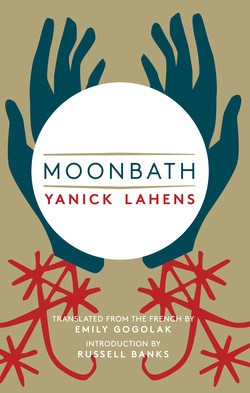Читать книгу Moonbath - Yanick Lahens - Страница 13
На сайте Литреса книга снята с продажи.
Оглавление6.
Nothing upset Olmène more than these acts of hate, tears, and blood between the Lafleurs and the Mésidors. Orvil, her father, sometimes relived them as though they had taken place the day before and not forty years earlier. Yet nothing troubled her as much in this dawn as the look of the lord and thug Tertulien Mésidor. A wind coming from the mountains stirred up the waves. Olmène looked at the sea, which seemed to breathe like a beast stretched out on its back, agitated by the ebb and flow of the blood of all the creatures and souls living within it. Nan zilé anba dlo, on the island under the waters. She secretly greeted the Dead, the Ancestors, and the Mysteries. Undoubtedly, Tertulien Mésidor’s fleeting and flagrant presence had plunged her into a strange disorder. Strange, but good…We, too, were troubled by that brisk and bizarre visit, but we left Olmène to herself…To taste her first feelings as a woman.
It was said that Tertulien Mésidor got his power and his money from a pact with the devil. That in the right pocket of his pants he hid a free pass, in indelible ink, issued by one of the secret societies, Zobop, Vlingbinding, or Bizango, that surprised the innocent on the roads at night. That he even reigned over one of them as emperor. That in the room upstairs, at the back of the far south end, behind two doors that were always closed, he hid a hideous creature with two horns on its head and a cork-screw tail. Without ever having seen it, several among us swore to have heard it howl at the full moon. Regarding the death of his fourth son, Candelon, we heard that he had offered him up in exchange for richness and power to a blood-thirsty God, Linglinsou or Bossou Trois Cornes.
“But they say so many things,” Olmène thought. She pushed back the blood that rose to her face and, with that blood, all these things said over and over again, endlessly repeated and rehashed, leaving the shock to fold into itself, inside of her, like an August storm.
As with God, if we believed in Tertulien, his power fascinated us all in spite of ourselves. Despite the suffering that he inflicted upon us, he fascinated us. Like his father, Anastase Mésidor, had fascinated us. Despite the wounds, thirst, pain, and hunger. And, since God made the earth tremble, overwhelmed the waters and crumbled the mountains, Tertulien perhaps had set his mind on resembling God. Maybe he wanted to outdo him by even making the stars and stones bleed. He was surrounded by this aura that power bestowed upon the strongest and that so often made us, the conquered, lower our heads and, nose to the earth, inhale the darkness.
When, some years before his death, a dispute had pitted his father, Anastase Mésidor, against men from the big city, the residents of these five hamlets and surrounding villages, including Anse Bleue, had armed themselves with machetes, cutlasses, and bâtons gaïacs.* And, with the help of some clairin, they pushed back the assault. The Mésidors had been dealt an attack by conquerers coming from afar, and we had all felt insulted by it. All of us. Without exception. Go figure! But that’s how we are. This pitched battle, which threw back the assailants, sealed a strange pact, another one, between the Mésidors, Anse Bleue, Ti Pistache, Morne Lavandou, Pointe Sable, and Roseaux. As fearsome and cruel as they were, the Mésidors were ours. We were even proud of them. But make no mistake about it. Under the shared blow, under the whipped pride, mistrust and fear were sleeping. They were always there. They blew inland like a soft black wind, sweeping the grass of the hills, passing through souls, and descending the dry slopes until reaching the sea. And returning to the hills and descending again. For us, mistrust and fear of a new and unexpected cruelty on the part of the Mésidors. And for the Mésidors, mistrust and fear of our unpredictable vengeance. Who knows?
When Tertulien Mésidor returned home after his trip to the market in Ti Pistache that morning, he, unlike other days, thought neither of his business nor of his political contacts, let alone of his wife, Marie-Elda. The image of Olmène had already taken hold over his entire body and swept everything else away. Absolutely everything. A man’s desire sharpened inside of him, and it made his eyes shine in the hot light of that early afternoon. He barely tasted what the servants put out for him on the table and he didn’t even notice his wife’s presence. “That’s enough, I’m not hungry anymore. I already ate.” At this very moment, all Tertulien Mésidor wanted a very young woman. Just one. A peasant, as he liked them. And not a meal.
It is the look of this man that Olmène had borne at the market in Ti Pistache. She had kept her eyes raised for a long time, but eventually dropped them before this rider who could have been her father and who had taken off his hat to talk to her, the daughter of a fisherman and a peasant. She had found the high and serene brow of man who, contrary to legends, contrary to what all of Anse Bleue slurred between clenched teeth, seemed to have a calm presence. The same calm with which he had gone inland toward his grand house with its big gates and all of its servants.
Ermancia, like the other women at market, like all of us, was caught between fear and wonder. Wonder sparked by the attention of a man that powerful, and fear by the often harmful consequences of such power over our lives.
